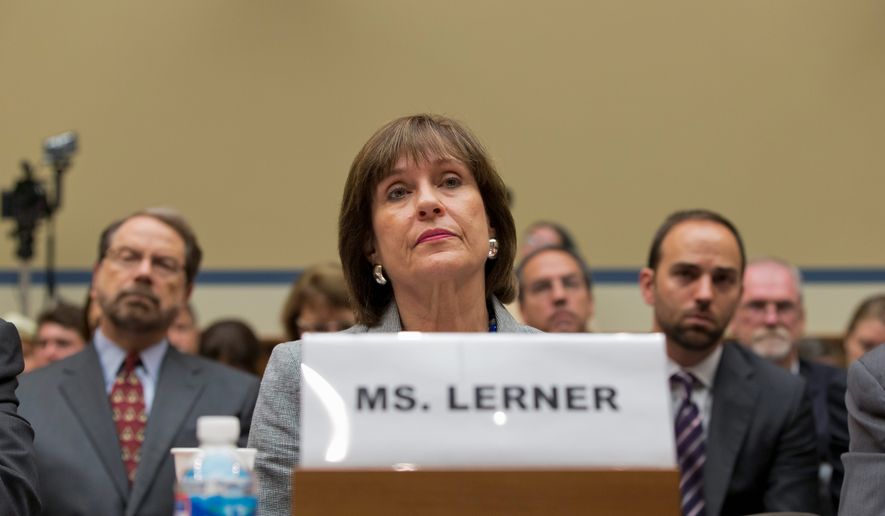The IRS admitted in court Wednesday that it wrongly targeted tea party and other conservative groups for intrusive scrutiny, placing specific blame on former senior executive Lois G. Lerner, and entered into a settlement designed to make sure that kind of political targeting never takes place again.
The filing, made in federal court in Washington, D.C., amounts to a stunning apology from the Trump administration for actions taken under President Barack Obama, when hundreds of tea party and conservative groups were singled out for intrusive screening, forced to wait years for their applications to be approved, and subjected to outrageous questions.
According to the documents, the IRS and tea party groups have asked a judge to declare that discrimination on the basis of political views is a violation of the First Amendment, and is illegal.
“Disparate treatment of taxpayers based solely on the taxpayers’ names, any lawful positions the taxpayers espouse on any issues, or the taxpayers’ associations or perceived associations with a particular political movement, position, or viewpoint is unlawful,” the consent agreement says.
The agreement will still have to be approved by the judge, but both the Trump administration and the lawyers representing more than 40 tea party groups agreed to the deal, clearing the way for court acceptance.
Perhaps most striking about the agreement is that it names and blames Ms. Lerner, a former executive who oversaw the IRS division responsible for handling nonprofit status applications.
SEE ALSO: IRS email points to political affiliation in tea party targeting scandal
Both the Obama Justice Department and then the Trump Justice Department cleared Ms. Lerner of wrongdoing, but the new agreement — which the Justice Department filed — says the former executive bears the blame.
“The then-Director of the EO Division, Lois Lerner, first became aware that the IRS received applications from Tea Party groups as early as April or May 2010. For the next two years, Lerner failed to adequately manage the EO Division employees who processed these applications,” the consent agreement says.
“Moreover, Lerner failed to inform upper-level IRS management of the serious delays in processing applications for tax-exempt status from Tea Party and other politically sensitive groups,” the agreement continues.
The consent decree was filed in a case brought by Linchpins of Liberty, one of the targeted groups, in Washington, D.C.
Another case — a class action lawsuit — is also raging in Ohio.
The Washington Times reported earlier Wednesday on documents filed in that case showing that despite its public denials, the IRS was singling out tea party and conservative cases because of their political affiliations.
The IRS has long maintained that it believed the tea party groups were testing the boundaries of what was allowed, and the agency was reacting to behavior.
But a key 2011 email from Elizabeth C. Kastenberg, an official in the agency’s Exempt Organizations division, says it was explicitly the groups’ politics that landed them on the target list.
“These cases are held back primarily because of their political party affiliation rather than specifically any political activities,” Ms. Kastenberg wrote in an alert to other IRS employees, including her supervisor.
Months later, Ms. Lerner visited with the agents working the tea party cases and ordered them to change the name of their lookout list from “tea party” to “advocacy” cases — but didn’t change their targeting. In fact, according to documents filed in the case, Ms. Lerner increased the scrutiny, ordering “development” letters with intrusive questions.
Despite initial claims by some Republicans, no evidence has ever traces the targeting back to Mr. Obama or his top political aides.
Democrats say liberal-leaning groups were also snared in the targeting, and point to a new inspector general’s report earlier this month that did find liberal groups faced long delays and extra scrutiny.
Still, investigators said the targeting was chiefly aimed at tea party groups.
They faced questions such as their political beliefs, their thoughts about whether they would run for office, and demands for their donors’ names.
The groups also faced immense delays in getting approvals.
The first group to trigger targeting, the Albuquerque Tea Party, applied in 2009 and was flagged for scrutiny in March 2010, but didn’t get approval of its nonprofit status until June of this year.
• Stephen Dinan can be reached at sdinan@washingtontimes.com.




Please read our comment policy before commenting.